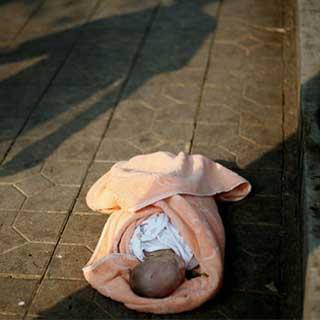
介绍:
An uncomfortable truth lingers in the wake of the recent suspension of the baby hatch program in Guangzhou, namely that the 262 children who were abandoned in the six weeks before its close – who all suffer some sort of illness, disease or birth defect – are the luckier ones.
They are lucky, firstly, to be in an orphanage, in a country where orphanages are stretched for resources or do not exist in many regions at all. Being in one, the children may have the opportunity to be adopted by domestic Chinese citizens or foreigners. However, this will likely be a long wait. Strict requirements for prospective adopters of Chinese children include proof of marriage for at least two years and that the couple show they aren’t overweight.
The focus, moreover, is on adopting healthy children, who are becoming the minority in China’s orphanages as the One-Child policy is relaxed. While the waiting list for special-needs children is much shorter, it is often a longer, more costly process of selection and screening before a suitable family is found – assuming the adoption program is ethical.
A lack of a unified welfare system means that China’s system for helping the sick and disabled, which relies on a combination of NGOs is piecemeal at best and, as China’s orphanages fill up with predominantly sick and disabled children, gaining access and support for their medical needs becomes an increasingly dire issue. It is often the prohibitive cost of medical care that led many struggling parents to leave their child in the first place, harboring the desperate hope their children would live a little longer under the care of the orphanage rather than face the certainty of death at home.
If they are very lucky, the disabled orphans may be admitted into the schoolyard, most likely into a special education school, as ordinary schools often prove inadequate to accommodate students’ needs or shut their gates completely. Already, they would have beat the 40 percent of disabled Chinese who are illiterate and the 28 percent of disabled school aged children denied access to any education, according to a 2013 Report from the China Disabled Person’s Federation. On graduation, they may have access to a handful of career paths, most commonly massage or music, and hope for the small chance that they will find employment. Even government departments only have, at best, 0.39 percent of their workforce comprised of employees with disabilities, according to the Beijing Yirenping Center.
There is no telling what future awaits the children who now call Guangzhou Social Welfare Institute home, except that they will likely continue to face an uphill battle for the rest of their lives.
For Caixin Online, this is Christina Guo
自2013年7月以来,经民政部正式发文推动,中国有30多个城市效仿西方国家的做法,为避免随意丢弃导致伤害,纷纷试点婴儿安全岛。这一体现人道主义精神的新政一时颇受好评。但据财新记者近日在各地了解,这些城市的婴儿安全岛,或如广州般不堪重负,被迫关停;或将政策收紧,对弃婴行为进行劝阻;而那些还在波澜不惊运行着的,则在媒体上找不到只言片语,就像从未存在过。其中更以广州市的故事最为极端。
和十年前相比,中国“先天缺陷”婴儿比例的统计数已大幅上升。卫生部门的《中国出生缺陷防治报告(2012)》显示,中国每年新增90万至100万有缺陷的新生儿。被广泛引用的2010年《中国儿童福利政策报告》则提到,相关部门保守统计,中国每年大约有10万名儿童被遗弃,大多为残疾儿童或女童。
民政部希望建立重度残疾儿童基本生活补贴和医疗康复补贴制度,“从源头上抑制弃婴现象”。但要让这个群体有尊严地存活下去,中国依然任重道远。
大家还在听

